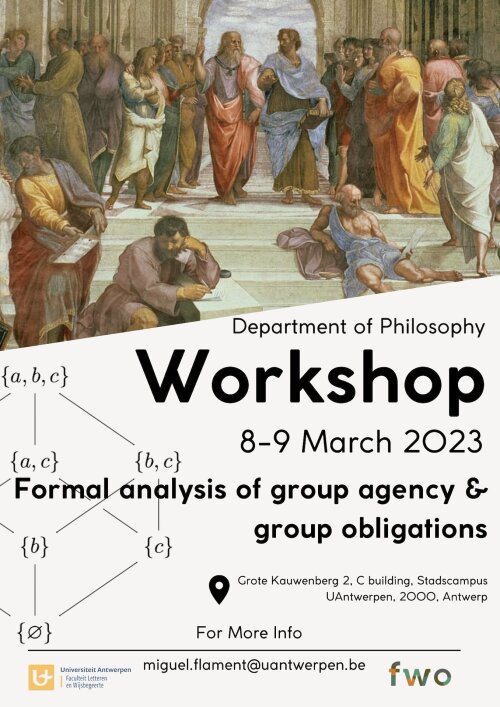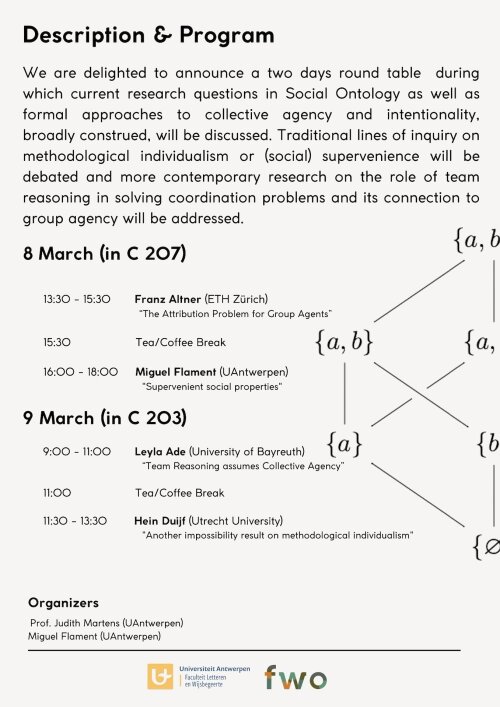Current issues in social ontology and formal approaches to collective agency.

On 8-9 March 2023, the workshop “Formal analysis of group agency and group obligations” was held in the Department of Philosophy of the University of Antwerp as part of the FWO funded research project "Realism and individualism in Social Ontology" (description accessible here). The two days roundtable was the opportunity to discuss current research questions in Social Ontology as well as formal approaches to collective agency and intentionality, broadly construed. Traditional lines of inquiry on methodological individualism or (social) supervenience were debated and more contemporary research on the role of team reasoning in solving coordination problems and its connection to group agency were addressed.
Invited Speakers & abstracts:
- Leyla Ade (University of Bayreuth): "Team reasoning assumes Collective Agency"
- Franz Altner (ETH Zürich): "The Attribution Problem for Group Agents"
- Hein Duijf (University of Utrecht): "Another impossibility result on methodological individualism"
- Miguel Flament (University of Antwerp): "Supervenient social properties"
Team reasoning assumes Collective Agency
Team reasoning is a game theoretic theory which allows the players to frame the problem at hand as one for the group rather than one for themselves individually. Team reasoning players are assumed to be subject to two transformations: A payoff transformation, adapting the group's preferences and an agency transformation, strategizing as a collective. The reduction of team reasoning to a payoff transformation has been a question of interest for many researchers, trying to understand whether or not the theory can be reduced to individual reasoning of the players. This paper draws a distinction between technical and philosophical reducibility. Including a critical review of a payoff transformation suggested by Duijf (2021) and arguing that the technical reduction might be possible. However, the impossibility of the philosophical reduction will be defended, thus, concluding that team reasoning assumes collective agency.
The Attribution Problem for Group Agents
This paper argues that accounts of group agency, which explain group mental states via members’ inputs into decision mechanisms fail to distinguish between, on the one hand, belief-desire pairs which give rise to intentions that speak for the agent, and, on the other, belief-desire pairs which are in some sense external to the group and do not count as reasons constituting intentional group actions. After considering several strategies whereby these accounts might fend off this challenge, I conclude that their problem in drawing this distinction results from their metaphysical commitments.
Supervenient social properties
Are collective obligations of some group ’nothing over and above’ the obligations of individuals of that group? This question has recently attracted more attention and is a new field of debate between proponents and opponents of methodological individualism, the position that any social phenomena can ultimately be explained in terms of, be reduced or is identical to the actions of and interrelations between individuals. This position is often rendered in one of its two variants (or both): ontological and explanatory individualisms. In this paper, I will explore a formal account of social supervenience as a tool to defend a non-reductive form of ontological individualism. The paper will vindicate the notion against prominent anti-individualists views (e.g. Epstein 2008, Epstein 2009). In particular, I will focus on the concepts of collective obligations, and investigate the claim that such obligations socially supervene on individual obligations. One original contribution of the paper is an analysis of obligations using the conceptual tools available in the metaphysics of properties.
Another impossibility result on methodological individualism
Methodological individualism is the position that all social phe- nomena are to be explained in terms of the actions and interactions of individuals. Game theory is often viewed as the pinnacle of methodological individualism and its prominent role in scientific programs that aim to provide micro-foundations for the social sciences. In this paper, we show that methodological individualism can be put to logical scrutiny by making the social and individualistic languages fully explicit and mathematically precise. In particular, we combine game theory with formal logic to argue against methodological indi- vidualism: we prove that there are no reductive explanations of the statement that a group maximizes expected utility using statements in an individualistic formal language that is widely used to model actions, omissions, abilities, and expected utility maximization of finitely many individual agents.
